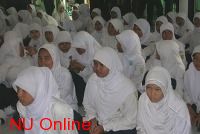Jakarta, NU Online
In countering social media recruitment drives by the Islamic State of Iraq and Syria ( ISIS ), the Indonesian government is keeping focus on curbing domestic support for the militant group. Meanwhile, religious leaders continue to warn Indonesian Muslims away from ISIS's misleading statements about Islam.
<>
The fight begins with pesantrens , and the Ministry of Religious Affairs would approach those schools and also co-operate with other ministries and religious leaders in diminishing ISIS's influence in Indonesia, said Nur Syam, the ministry's general secretary.
"It is important that our pesantren are a safe place to learn about Islam," he told Khabar Southeast Asia. "This means preventing the pesantren from being used to spread radicalism or as places for recruitment for militants."
The ministry cannot accomplish this on its own and needs strong co-operation from civil society organisations, which operate at the grass roots-level, he said.
"They also can help us to identify a number of pesantren that do not have permits for operating. We are suspicious that those places are being used by militants to pursue their goals," he said. "Currently, we are focusing on West Java, East Java, East Nusa Tenggara and Poso."
The department initiated a dialogue with 70,000 pesantren and will work to ensure they do not spread messages of hatred or radicalism, he added
"We also continue to watch for organisations acting on behalf of militant organisations," Nur said.
Madiun to respond ministry's call
The head of Pesantren Sabilil Muttaqien in Madiun, Muhammad Suparlan, said his pesantren was aware of the ISIS threat and would continue to watch out for suspicious activities there.
"If pesantren are spreading hatred or any radical messages from militants encouraging them to kill other Muslims or other human beings, then that place is no longer a pesantren," he told Khabar. "All Muslims know pesantren are places to find peace, to find God's commands, and to practice them."
His pesantren trained all of its santri (Muslim students), and clerics by using social media YouTube, blogs and other tools. It will work to anticipate and prevent wrong teachings spouted by ISIS, Muttaqien said.
"Our society's culture is changing, and so we have to be open with it. If the recruitment is now often conducted over social media, then we all should know how to combat this through the same tools. Our society must also know this. Society receives similar training to understand the dangers of ISIS," he continued.
According to terrorism expert Taufik Andrie, it is very important for the government to continue to track pesantrens that do not have permits or credibility.
"We should be cautious if their dakwah (preaching) is misleading. This is important to prevent the spread of radicalism. This approach is once more relying on the local culture. Local leaders need to cooperate with religious leaders to see what is common in society," he said. "For example, local forums like rembug desa (village hall meeting) can be used to address this situation."
Taufik credited government efforts, saying they were doing a good job in communicating with pesantren and controlling the spread of radicalism through cultural approaches and grassroots efforts.
"Pesantrens are a place to help Muslims study the Qur'an"
Kediri, East Java Muslim leader and local pesantren chairman Al-Fatah Abudullah Sobari, told Khabar that local pesantrens would stand up against radicalism.
"We will ensure that our region and our pesantren is clean from any radicalism including ISIS's ideology. ISIS is not Islamic, and their teachings do not represent Islam," he told Khabar.
His pesantren has come up with a strategy for combatting radicalism, he said.
"We introduced to our santri to what militants have done to innocent people in Indonesia, Syria, and many other places. They accept it because it is true that terrorism and killing people are not based on Islamic teachings," he said.
Editing by Sudarto Murtaufiq
Terpopuler
1
Khutbah Jumat: Ramadhan dan Kesempatan yang Tidak Selalu Terulang
2
Innalillah, Ulama Mazhab Syafii asal Suriah Syekh Hasan Hitou Wafat dalam Usia 83 Tahun
3
Kultum Ramadhan: Lebih Baik Sedikit tapi Istiqamah
4
Khutbah Jumat: Ramadhan, Melatih Sabar, Memperkuat Syukur
5
Keluar Mani yang Tidak dan Membatalkan Puasa
6
Khutbah Jumat: Tiga Kebahagiaan Orang Puasa
Terkini
Lihat Semua
















